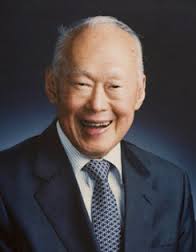By JOSEPH B WINFUL
Singapore’s former prime minister Lee Kuan Yew, the father of the country’s economic miracle of the last 50 years, was a frequent visitor to Africa in the 1960s. On one such trip in 1964, he visited 17 African capitals to acquaint himself with what the newly independent African countries were doing to lift themselves from economic backwardness, itself a legacy of European colonialism of the previous century. From what he saw, Lee Kuan Yew was not best impressed. “I was not optimistic about Africa,” he confessed later. So, what informed his thinking? He explains in his fat book, published in 2000, From Third World to First – The Singapore Story: 1965-2000, that certain things were happening in Africa at the time that did not seem quite right to him.
For example, while in Lagos (Nigeria) in January 1966, to attend a Commonwealth heads of state conference, Lee Kuan Yew was a bit alarmed by how Sir Abubakar Tafawa Balewa’s government was doing things. “I went to bed that night [at the Federal Palace Hotel in Lagos] convinced that they were a different people playing to a different set of rules.”
True to his fears, only days after the Commonwealth conference ended, and just as Lee Kuan Yew and his delegation had arrived in Ghana from Nigeria, a military coup happened in Lagos in which President Balewa was killed. In Ghana, the Singaporean prime minister was welcomed heartily by President Kwame Nkrumah who was very proud of his bright 30-year-old vice chancellor of the University of Ghana, William Abraham. Abraham had taken a first in Classics at Oxford University (England) and was a fellow of the university’s All Souls College. Lee Kuan Yew was a bit puzzled: “I was impressed [with Abraham], but wondered why a country so dependent on agriculture should have its brightest and best do Classics – Latin and Greek,” Lee Kuan Yew wrote many years later. But that was Africa, and that is still Africa!
We study what we don’t need, and need what we don’t study. After inheriting an educational system from the colonialists who wanted not more than paper-pushers and lots of messengers, the newly independent African countries just carried on with the inherited educational system as if no independence had come at all, and as if the agendas and aspirations of the colonial were
Lee Kuan Yew continues: “One month later [after Nigeria’s coup], on 24 February, as Nkrumah was being welcomed with a 21-gun salute in Beijing, China, an army coup took place in Accra. People danced in the streets as the army leaders arrested leading members of Nkrumah’s government. “My fears for the people of Ghana were not misplaced. Notwithstanding their rich cocoa plantations, gold mines, and Volta dam, which could generate enormous amounts of power, Ghana’s economy sank into disrepair and has not recovered the early promise it held out at independence in 1957. The news I heard saddened me. I never visited Ghana again.”
And guess what happened next: After the Ghana coup, Lee Kuan Yew enquired about William Abraham, “the bright young vice chancellor”, and was told that Abraham had entered a monastery in California, USA!
“I felt sad,” Lee Kuan Yew recounts. “If their brightest and best gave up the fight and sought refuge in a monastery, not in Africa but in California, the road to recovery would be long and difficult.” And that is exactly what it has been – “long and difficult” for Africa.
Lee Kuan Yew remembers his visit to Zambia in 1970, for the Non-Aligned Summit. Zambia’s economy had declined at the time. “Everything was in short supply,” the former Singaporean prime minister recalls. “The shops were empty. Imported toiletries were absent and there was little by way of local substitutes … [President] Kenneth Kaunda’s major preoccupation was politics, black versus white politics, not the economics of growth for Zambia … After Kaunda left, the lot of Zambians did not improve much.”
In contrast, Singapore’s economic fortunes have been going up and up and up since those days, to the extent where, today, an African visiting the island state for the first time could be excused if he rubbed his eyes to make sure that what he is seeing is real. Whatever Africa does from now on, the continent should find time to study how Singapore got it right – in just the same period that Africa appeared to have lost its way. In fact, there is a lot to learn from how this small island city-state (size: 264 sq miles, the 189th largest of the world’s 206 countries), rose from poverty into wealth.
Source: MODERN GHANA











